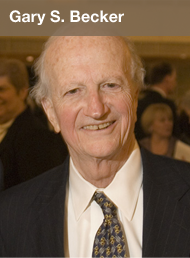
Suggestions for More from Gary Becker
February 11, 2011
In the opening session of the conference honoring Gary S. Becker on the occasion of his 80th birthday, Becker got an unexpected gift: free research assistance from none other than former Secretary of State George P. Shultz.
Formerly the dean of the University of Chicago Booth School of Business, Shultz went on to achieve the rare distinction of serving in four Cabinet Posts. Today he is once again a colleague of Becker’s at the Hoover Institution, where both are fellows. At the conference Shultz shared Chicago memories and some research assignments for Becker.
“I decided to come here in the spirit of making suggestions for things you could work on,” Shultz said. After reviewing Becker’s extensive body of work, Shultz chose to focus on a 2005 blog about the failure of the war on drugs. “I will start by summarizing your argument and pick it apart a little. As your self-appointed research assistant, I’m going to give you some leads you could pursue.”
Aggressive efforts to reduce drug trafficking and use should raise prices. High prices and stringent punishment should reduce demand. In fact, as Becker points out on his blog, the drug war has simply made drug trade hugely profitable, increasing prices by at least 200 percent without lowering demand.
Quoting Becker’s blog, Shultz said, “Every American president since Nixon has engaged in this war. Every one, without exception, has lost this war.” He added, “I want to put an exclamation point on ‘lost’. Not only has this policy failed to keep drugs out of the U.S., but the World Health Organization shows that despite its punitive approach, the U.S has cocaine and cannabis usage rates that are much higher than other countries.”
The costs of enforcement and incarceration are estimated at $100 billion per year and do not include the immense and tragic costs of drug violence on society in Mexico, our neighbor and trading partner, or in Guatemala, where the situation is even worse, Shultz said.
“All of this brings me to agree with Gary’s analysis. In view of the immense cost, including human cost, the war on drugs is an utter failure, yet we have not done a thing about it. Only a few people, including Gary and Milton Friedman, have been willing to speak out.”
In his blog, Becker wrote that legalization of the production and use of drugs, combined with an excise tax on drug consumption, would be a far cheaper way to control the drug problem. The costs of police enforcement and incarceration would fall dramatically, and the tax would keep prices from falling and generating increased demand. “I agree with this position, and as his research assistant, I suggest some additional things for Gary to look into,” Shultz said.
- To develop their market, drug dealers often give free drugs to get people hooked. What is the effect of removing this incentive, by making drugs very expensive for new users and cheap or free for addicted users, for example? Look into the degree to which demand curve can be shifted to the left.
- Quantify the impact that effective advertising campaigns might have on the demand for drugs. Look to the Montana Meth Project as an example.
- Explore the comparative costs of anti-drug efforts, and who bears these costs.
- Examine the efficacy of attempts in other countries, such as Portugal, to decriminalize drug use.
Reducing the harm to individuals and the immense costs of drug interdiction is a vast and complex policy problem. Researchers can attack it by working continuously on the problem in small steps, Shultz said.
“This is where Gary comes in, with his ability to reduce these problems to compelling economic logic. Gary, this is a big assignment, but you have plenty of time to do it. From the standpoint of my 90 years, you’re a promising young man.”

